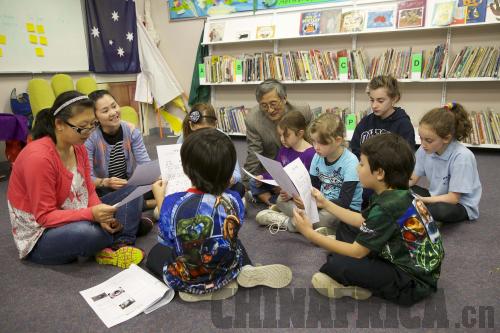| 
Gentle reader, I have no head... no, no, please don't recoil and look at me in horror, this is no Nearly Headless Nick from the Harry Potter movies accosting you. I was merely going to say that I have no head for foreign languages.
This deficiency probably stems from a childhood trauma when I was exposed to the "lingua franca" of my own country. While India has over 1,600 officially recognized languages, Hindi, by virtue of being the language of Bollywood, India's retort to Hollywood, is regarded as the one understood by most. But it seemed a most distressingly illogical language to me. For example, everything in Hindi has a gender. You can't refer to even a pair of old shoes with holes in them as them. They have to be referred to deferentially as either she or he. Once you manage to get over this shock, you are hit by a second and bigger one when you realize that in the Hindi world, nothing is as it seems. A policeman is she, so are mustaches and ties; on the other hand, the fridge and spices, commonly associated with women, are he.
So imagine my panic when my Sinologist friends warned me of the challenges surrounding learning Chinese as I moved to Beijing. I still remember the direst one. "Chinese is a very tonal language," said this naysayer. "Ma means mother if you say it one way; but say it in another way and it becomes horse. If you are not careful, you will turn your mother into a horse."
I was quaking like jelly when I picked up my first teach-yourself-Chinese book and guess what! The ma-mother-horse triangle story was there, right in the introduction! The realization that the warning had not come from personal experience but was simply snitched from someone else gave me courage and since then, I have never faltered. If you ever come across a determined-looking woman clutching a well-worn blue notebook, surrounded by a group of mystified onlookers and holding up the traffic, you can bet your bottom yuan it's me, the un-deflectable pursuer of Mandarin. Wherever I go, I have long conversations in Chinese. Well, the conversations take long because from time to time I have to delve into the aforementioned notebook to locate the elusive words I am looking for. Since the notebook also contains my grocery list, measurements for various Ikea items and the names of the subway stations and lines to popular destinations, the searches are often laborious. But the Chinese are the most patient and kindest audience. They drop their shopping, babies and boyfriends to encourage you to speak on. Each awkwardly uttered word is greeted with rapturous delight followed by hurried consultations among the crowd as to what it could mean.
If England is a "nation of shopkeepers," then China is a nation of teachers. Everybody you speak with will involuntarily pause to correct your pronunciation. I once missed three trains because the subway rider I had asked about a station was not satisfied with the way I pronounced it and would not relent till I could do it to his satisfaction. But then he probably missed three trains of his own as well and I couldn't complain. Then there was the man who came to fix the Internet connection. He stood on the bannister of the communal staircase on one foot like some contemplative stork, craning his neck to inspect a distant spot in the ceiling with the aid of a torch in one hand and speaking non-stop into a phone at the same time. When I told him I had found a ladder and he could come down from his perilous perch, instead of alighting and thanking me for saving his life he merely switched his attention from the phone to me and proceeded to tell me the right way to say ti zi.
All this is done with so much altruism and tolerance that I have come to regard Chinese as the language of kindness. I remember a late-night adventure when I couldn't find the way to my apartment from the subway station and asked the proprietor of the nearby Hi-24 store for directions. He first drew a map for me on the back of a flyer and when it was evident I was map-blind, started giving me verbal directions. Then seeing my uncomprehending look, he gripped me kindly but firmly by the elbow, slowly propelled me out of the store and then marched me to my apartment building a block away - even though he had five customers waiting. |